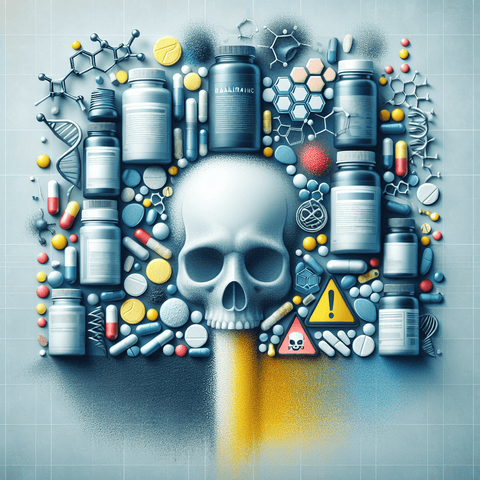Introduction
In recent decades, dietary supplements have surged in popularity as more individuals turn to vitamins, minerals, and herbal extracts to support well-being, fill nutritional gaps, and manage specific health conditions. With shelves lined with an array of pills, powders, gummies, and drops promising everything from better sleep to enhanced energy and immunity, consumers are faced with a dizzying selection of products. The increased accessibility of these supplements, both in physical stores and online, has made self-directed supplementation easier than ever—but at what cost?
While some dietary supplements can be beneficial when used properly and under the guidance of healthcare providers, others present significant risks. Some contain questionable ingredients, are mislabelled, contain undisclosed substances, or exceed safe dosages. The lack of strict regulations in some regions can lead to the availability of supplements that are ineffective at best and dangerous at worst.
Unfortunately, many people assume that because these products are "natural" or available without a prescription, they are inherently safe. However, this notion can lead to adverse health effects, especially when supplements interact with medications or medical conditions, are consumed in excess, or contain adulterated substances. Consulting with a qualified healthcare professional and understanding the risks associated with specific supplements is vital for safe use.
The purpose of this article is to provide a comprehensive guide on which dietary supplements and ingredients should be avoided due to safety and health reasons. By identifying known health risks, regulatory red flags, and suspect ingredients, this blog aims to empower readers with the knowledge needed to navigate supplement use with confidence and caution.
Dietary Supplements to Avoid
As the supplement market continues to grow, consumers are frequently bombarded with advertisements for products that promise improved energy, weight loss, enhanced sexual performance, or boosted immunity. However, certain types of supplements are now known to pose health risks and should be approached with caution—or avoided entirely.
Among the most frequently problematic are:
- Weight Loss Supplements: These often contain stimulants or appetite suppressants that can increase blood pressure, cause heart palpitations, or lead to anxiety. Ingredients such as synephrine (a bitter orange extract) and high doses of caffeine are commonly implicated.
- Bodybuilding and Performance Enhancers: Some supplements marketed toward athletes and bodybuilders, such as testosterone boosters or pre-workout formulas, may include anabolic steroid analogues, stimulants like DMAA (1,3-dimethylamylamine), or even prescription drugs.
- Sexual Enhancement Products: These are notorious for containing undeclared pharmaceutical drugs like sildenafil (the active ingredient in Viagra), which can interact with nitrates and cause dangerous drops in blood pressure.
- ‘Detox’ Teas and Cleanses: Frequently marketed as a natural way to rid the body of toxins, they often include laxative ingredients (e.g., senna or cascara sagrada), which can cause dehydration, electrolyte imbalances, or dependency with long-term use.
So how can consumers identify potentially dangerous products? Here are some red flags:
- Too-good-to-be-true claims: Products that claim to "melt away fat," "cure all cancers," or provide "miracle results" often lack scientific backing.
- Use of proprietary blends: These may mask the actual quantity of each ingredient, making it hard to assess dosage and safety.
- Poor or no third-party testing: Reputable companies often use independent labs to confirm product purity and potency.
- Imported products: Supplements manufactured outside the EU and sold online may not be subject to the same rigorous safety and labelling standards.
Always consult a healthcare provider or clinical nutritionist before beginning a new supplement regimen. Even seemingly benign substances like vitamins can cause adverse effects or interact with medications.
Some safe, well-formulated products can offer benefits when used appropriately. For instance, those interested in supporting general energy levels might consider a magnesium supplement, especially when confirmed by lab tests showing a deficiency. But indiscriminate supplementation without medical guidance can be harmful—sometimes fatally so.
Harmful Supplement Ingredients to Watch Out For
To make well-informed decisions, it's crucial to understand the ingredients that turn ordinary supplements into potentially hazardous products. Not all ingredient risks stem from overtly toxic compounds—some harms come from hidden substances, drug interactions, or high doses of seemingly "natural" ingredients.
Let’s explore some commonly found harmful ingredients:
- Sibutramine: Once prescribed for weight loss and later banned in most regions due to its link to cardiovascular events. Still, it's occasionally detected in over-the-counter weight loss products.
- DMHA (1,5-Dimethylhexylamine) and DMAA (1,3-DMAA): These stimulants were used in pre-workout supplements and fat burners and are associated with high blood pressure, cardiovascular stress, and neurological risks. Both are subject to bans in many countries.
- Yohimbe: Sourced from the bark of an African tree, this ingredient is used for sexual enhancement and fat burning. However, it can cause heart arrhythmias, anxiety, and kidney failure in high doses.
- Kava: An herbal remedy for anxiety and sleep disorders, kava may lead to severe liver damage and has led to bans in multiple countries.
One of the biggest consumer risks comes from supplements that include hidden or undeclared ingredients. The World Health Organization and national watchdog agencies have frequently issued warnings about products containing prescription drugs not listed on the label. These products often evade regulators by being sold online or under vague marketing descriptions.
Unfortunately, lax manufacturing practices can result in contamination with heavy metals (like lead, mercury, cadmium), pesticide residues, or microbial contaminants. Some protein powders, for example, tested positive for high lead content, especially those sourced from sketchy supply chains.
Notably, the European Food Safety Authority (EFSA) maintains a comprehensive list of substances under scrutiny or banned in food supplements. Consumers are urged to verify the status of ingredients and choose products that are compliant with EFSA regulations.
To prevent exposure to dangerous compounds, consider choosing brands that are transparent about their sourcing and formulation practices. Supplements sold at reputable retailers like Top Vitamine’s omega-3 category are less likely to contain undeclared substances, as selection often undergoes more rigorous vetting.
Unsafe Dietary Supplements: What You Should Be Cautious About
Beyond harmful ingredients, some dietary supplements are unsafe due to poor manufacturing, contamination, or exaggerated claims. These risks transform what might seem like harmless health boosters into serious health hazards.
Contamination is a frequent issue. For example, supplements have been found contaminated with heavy metals, molds, bacteria, or undeclared pharmaceuticals. Even supplements aimed at general wellness or immunity—such as herbal blends or powdered greens—have occasionally tested positive for salmonella or dangerous molds.
Another red flag is supplements that present unverified health claims. If a product promises to prevent, treat, or cure diseases—such as cancer, HIV, or COVID-19—without any validation from reputable clinical studies or EFSA opinions, it should be avoided. Not only do such claims mislead consumers, but they also delay legitimate treatment and pose serious health risks.
Popular but problematic examples include:
- Supplements claiming to ‘cure cancer’ or ‘eliminate tumors’ without any EFSA endorsement or peer-reviewed trials.
- ‘Brain boosters’ aimed at students or elderly populations that feature illegal racetams or undisclosed drugs.
- High-dose vitamin or mineral blends marketed as immune-enhancing, which may cause toxicity if consumed daily without supervision.
Consumers should also be aware of the regulatory limits. In the EU, supplements are treated as foods and not as medications. Therefore, they are not subject to the same stringent testing, and there’s little oversight unless a complaint is filed or harm is evidenced. However, agencies like the EFSA and national food authorities periodically issue recalls and safety alerts involving supplements.
Choosing products from companies that follow Good Manufacturing Practices (GMP), undergo third-party lab testing, and make no unauthorized health claims is crucial. Browsing the broad collection of quality-assured supplements like Vitamin C supplements allows consumers to shop confidently, knowing they are selecting safer alternatives.
Supplement Side Effects You Need to Know
For many, supplements are part of a daily health routine. But what if those multivitamins or herbal pills were doing more harm than good? Supplement side effects—ranging from mild digestive problems to life-threatening complications—are more common than often assumed.
Some of the typical side effects associated with supplements include:
- Nausea, bloating, and gas: Common with zinc, iron, magnesium, and multivitamins when taken on an empty stomach.
- Kidney stones: Excessive intake of calcium or vitamin C may contribute to stone formation in predisposed individuals.
- Toxicity symptoms: Overconsumption of vitamin A can cause headaches, blurred vision, liver damage, and birth defects during pregnancy.
- Bleeding risks: High doses of vitamin E or omega-3 fatty acids can affect clotting, especially before surgery or in combination with blood thinners.
Severe consequences are also on record. Liver damage, one of the most dangerous effects, has been linked to certain bodybuilding and weight-loss supplements. The incidence of drug-induced liver injury (DILI) associated with supplements has risen substantially in the last decade.
Poor quality control also contributes to side effects. For example, inconsistent dosages between batches or accidental contamination with allergens (e.g., gluten or nuts) can cause reactions in sensitive users.
Case examples highlight the dangers. A widely cited case involved individuals hospitalized with acute liver failure after taking a contaminated green tea extract supplement advertised as a fat burner. Another involved a teenager who suffered a heart attack after using a pre-workout drink laced with unapproved stimulants.
These cases underline the need for critical evaluation of all supplements—even those perceived as natural. Opt for reputable sources and look for formulations that align with safe dosing guidelines. If muscle or bone support is a concern, considering regulated options like vitamin K combinations with magnesium may be more appropriate when supervised.
Risky Vitamins to Avoid
While vitamins are essential for health, more is not always better. In fact, overconsumption or inappropriate combinations of certain vitamins can be dangerous—even life-threatening—especially when taken long-term without medical oversight.
The vitamins most commonly associated with toxicity are the fat-soluble vitamins—A, D, E, and K. These accumulate in the body, unlike water-soluble ones, and overdosing them can cause serious issues:
- Vitamin A: High doses may lead to liver damage, headache, skin changes, and teratogenic effects in pregnant women. Chronic use can result in hypervitaminosis A.
- Vitamin D: While essential for calcium absorption and bone health, too much can cause hypercalcemia, leading to nausea, kidney damage, and confusion.
- Vitamin E: Large doses can thin blood and elevate the risk of bleeding, particularly in individuals on anticoagulants.
- Vitamin K: Although generally safe, excessive supplemental intake might interfere with blood thinning medications.
Population-specific risks should also be noted. Pregnant women should avoid high-dose preformed vitamin A due to the risk of birth defects. Children, due to their smaller body mass, are more susceptible to vitamin overdose from gummies or flavored chewables.
Synthetic vitamins can also introduce challenges. Some synthetic forms, like dl-alpha tocopherol (a synthetic form of vitamin E), are less active than their natural counterparts and may have different absorption patterns. For those seeking supplementation, exploring natural sources and balanced formulations such as vitamin D products verified for safety and absorption is better advised under clinical guidance.
Proper dosing, form, and timing are key. It’s always advisable to conduct blood work first to determine vitamin levels before beginning supplementation to avoid unnecessary or risk-prone vitamin intake.
Questionable Nutrition Supplements: Are They Worth the Risk?
Supplements that promise to "melt fat," "sharpen the mind instantly," or "deliver six-pack abs in weeks" fall into a category of questionable nutritional supplements. While some may appear safe, their marketing often outweighs their scientific backing.
Some commonly questionable supplement categories include:
- Detox or cleansing supplements: Often marketed without evidence, these can disturb electrolyte balance and compromise gut health if abused.
- Superfood powders claiming disease reversal: While nutrient-dense, claims that they prevent or reverse disease without clinical evidence are misleading.
- Anti-aging supplements: Products with resveratrol, NAD boosters, or telomere enhancers are often sold at premium prices with minimal supporting evidence.
Critical thinking is essential when evaluating these products. Reliable supplements are evidence-based, with clear ingredient lists, third-party certifications, and an absence of miracle claims. Consumers should be cautious of endorsements by non-medical influencers or dramatic before-and-after photos.
To reduce risk, rely on actionable insights from qualified sources and validated clinical research. For example, EFSA-approved health claims support nutrients like magnesium for normal muscle function and vitamin C for immune support. If you're looking to support basic wellness, explore legitimate options such as vitamin C supplements or omega-3 fatty acids that align with approved health functions.
Conclusion
Dietary supplements can offer targeted support when they are selected carefully and used correctly. However, the marketplace is saturated with products that range from ineffective to downright dangerous. Personal safety hinges on informed decisions based on scientific evidence and professional input.
In this article, we explored supplements and ingredients best avoided due to known adverse effects—such as weight loss drugs, untested stimulants, and contradictory blends sold with miracle promises. We reviewed ingredients linked to toxicity and contamination, the reality of exaggerated claims, and the very real dangers associated with overdosing certain vitamins, in particular vitamin A and D.
Consumers are strongly encouraged to speak with healthcare providers before introducing new supplements, seek products reviewed by third-party labs, and validate every claim with scientific scrutiny. Safe supplementation starts with awareness, and your health deserves nothing less.
For regulated, science-backed options that support your well-being, explore Topvitamine’s range of vitamin D options or magnesium supplements known for their consistent quality and adherence to EU safety guidelines.
Q&A Section
Q: What are the most dangerous dietary supplements?
A: Some of the most dangerous supplements include those for weight loss, bodybuilding, and sexual enhancement, especially when they contain hidden or banned substances. Products with DMAA, yohimbe, or sibutramine can cause serious health issues.
Q: Are natural supplements always safe?
A: No. ‘Natural’ doesn't mean safe. Some natural supplements like kava or yohimbe can cause liver damage or cardiovascular issues.
Q: What vitamins are risky when taken in excess?
A: Fat-soluble vitamins—especially vitamin A and D—can accumulate in the body and cause toxicity if overused without medical supervision.
Q: How can I tell if a supplement is safe?
A: Check for third-party testing certification, avoid miracle claims, review dosage, and consult your doctor or pharmacist. Reputable sources like Topvitamine.com carry products compliant with EU regulations.
Q: Should I consult a doctor before taking supplements?
A: Yes, especially if you’re taking medications, managing a health condition, are pregnant, or considering high-dose supplements. Clinical oversight helps avoid interactions and side effects.
Important Keywords
- unsafe dietary supplements
- harmful supplement ingredients
- vitamin overdose risks
- supplements to avoid
- side effects of supplements
- dietary supplement dangers
- effectiveness of nutrition supplements
- unregulated supplement risks
- banned supplements
- dangerous vitamins
- how to choose safe supplements
- health risks of supplements



